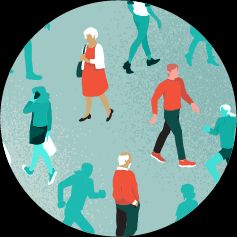A diagnosis of hepatitis C can mean different things for different people. Some patients meet the challenge head on, like they would any other disease. They talk to their doctor, get through their treatments, and move on. For others, however, it’s not so easy. Lifestyles, addictions, or family responsibilities can get in the way of treatment, and it can be difficult to see a way out.
Healthline interviewed two hepatitis C patients with very different, equally insightful experiences: Lucinda K. Porter, RN, a nurse, health educator, and author of Free from Hepatitis C and Hepatitis C Treatment One Step at a Time and Crystal Walker (name changed at the patient’s request).
Lucinda knows that she contracted HCV in 1988, because she had classic symptoms following a blood transfusion. A reliable test wasn’t available until 1992, but since she was certain she had it, she didn’t have a confirmatory test until 1996. At that point, she had a genotype test, which is an important piece of information in making treatment decisions. She learned that she had genotype 1a.
Her first treatment was interferon monotherapy in 1997. Since she did not respond to this particular therapy, this was stopped after three months. The second treatment she received was 48 weeks of peginterferon and ribavirin in 2003. Things were going well, until she relapsed in the post-treatment stage. The third treatment was a 12-week clinical trial using sofosbuvir, ledipasvir, and ribavirin. This was in 2013, and Lucinda is now free of HCV.
Lucinda’s experiences with her medications were typical. The first two treatments with interferon led to depression, and everything dried up, especially her mouth, skin, and eyes. She experienced muscle aches, joint pain, and occasional chills and fever. Her mind was so foggy that she was unreliable. She couldn’t concentrate on anything. The treatments that included ribavirin resulted in the usual ribavirin-related side effects: fatigue, insomnia, hemolytic anemia, irritability, insomnia, rash, lightheadedness, and headache.
But, despite the side effects, Lucinda maintained a singular focus, and was determined to get healthy. She offers the following excellent advice for those beginning their hepatitis C journey:
“Side effects are problems for which there are solutions. Don’t be afraid of side effects. Work with your medical team to find ways to get through them. Keep your eyes on the goal, which is to be free of hepatitis C… We also die prematurely from other causes of death, such as heart disease, cancer, and stroke. You don’t have to die—hepatitis C is a winnable battle if you pick up the weapons and fight. The weapons are getting better, and the next generation of hepatitis C treatment has mild and brief side effects. Talk to your doctor and find out how you can live free of hepatitis C.”
Crystal was diagnosed with the hepatitis C virus (HCV) in 2009, when she was pregnant with her second child. A long-time drug addict, she knows only too well how she contracted the virus. In the beginning, her doctor prescribed interferon. It may have helped; it may not have. Due to her pregnancy, she had to come off the drug relatively quickly and stopped seeing her doctor.
After giving birth, Crystal discovered her doctor no longer worked at the same hospital. With no money, and only Medicaid to help her, she struggled to find another doctor who would see her. When she finally found someone, he saw her long enough to write a prescription for roferon-A and never followed up. The side effects from the medication were too much for Crystal to bear, and she sought out another doctor. This one refused to treat her HCV until Crystal underwent a psychiatric evaluation and attended therapy for eight months. By this time, Crystal’s infection had progressed from acute to chronic, and she had to submit to regular drug testing.
Unable to pass a drug test, Crystal lost her Medicaid benefits and is no longer eligible to receive treatment. Frustrated, scared, and in constant pain, she struggles to maintain sobriety and fears for her children’s safety. She has taught them that her blood is “poison” and to always be careful around Mommy. Crystal fears that her opportunities have run out. That it’s now too late for her. But she wants to offer a bit of advice to those who are just starting out, and for whom it’s not yet too late: “Whatever you do, stay clean. Suck it up, stick it out, and pray to God that it works.”









